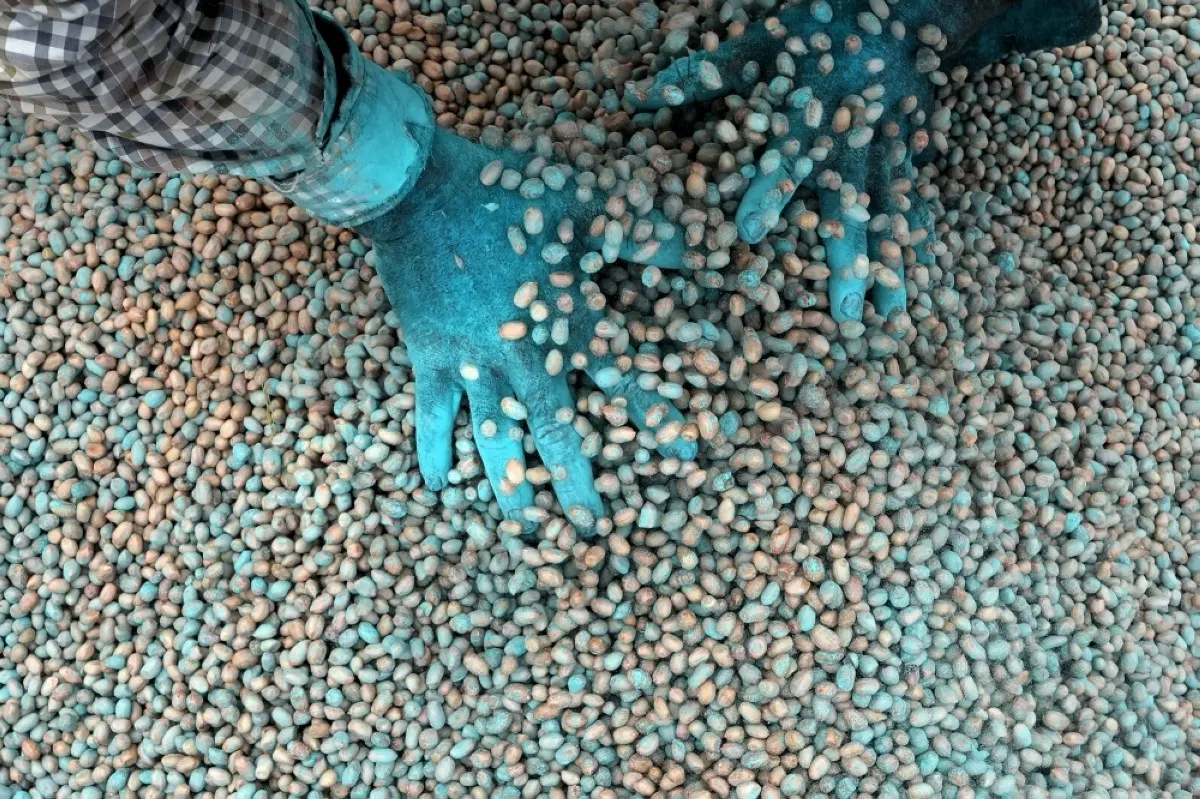03/10/2024
03/10/2024

P. Ravinder Reddy, a farmer, applies fungicide to peanut seeds before sowing in Rayanpet village of Telangana state, India, Wednesday, Sept. 25, 2024. (AP)
BENGALURU, India, Oct 3, (AP): Unpredictable rains and increasing heat aren't just making life more difficult for the people of Rayanpet, a village in India's arid south. They're also taking a toll on the thousands of acres of rice grown here.
"We used to know when it would rain and for how long and we sowed our seeds accordingly," said P. Ravinder Reddy, a former soldier who turned to farming on his family's land 16 years ago. "Now it’s so unpredictable and many times the seeds don’t sprout either because there’s too much rain or it’s completely dry.”
Fortunately for Reddy, agricultural research organizations in India have been working for years to engineer rice seeds that can better withstand the vagaries of climate. He's been experimenting with the new varieties for the past five years, and said they're giving better yields with less water and are more disease-resistant.
"I have planted them across a quarter of my 25-acre field because there’s still demand for older varieties but I think in a few years, we will use only these tougher seeds,” Reddy said.
India is one of the world’s largest producers and consumers of wheat and rice. Research organizations here, like their counterparts around the world, have long worked to produce seeds that increase yields, withstand drought or resist plant diseases. It's a growing need as a changing climate leads to more extreme and unpredictable weather.
According to a United Nations report released earlier this year, more than 700 million people went hungry last year and over a third of the global population is unable to afford a healthy diet, thus increasing the urgency for resilient seeds that can produce food reliably. Apart from India, other programs including a United States government program and privately funded projects are helping develop climate-resilient crops in Africa, Central America, and other Asian countries.
As India is among the countries most vulnerable to climate impacts, these new seeds are essential in ensuring it produces enough food for its people as well as for export.
As climate change intensifies, India’s nearly 120 million farmers - most with less than 5 acres of land - are seeing their livelihoods threatened by erratic rainfall patterns, rising temperatures, and increased pest infestations.
Some are taking to what is called natural farming - techniques like using natural fertilizers and planting crops alongside trees and other plants that can protect crops from wind, erosion, and some extreme weather - to deal with climate change. But that can mean reduced yields, and India’s federal government is also promoting the use of climate-resilient seeds that don’t compromise yields.
Increasing salinity in groundwater, heavy rainfall over short periods, prolonged droughts and even increasing nighttime temperatures can affect rice seeds, experts say.
"We really need these seeds to deal with these multiple issues created by global warming,” said Ashok Kumar Singh, former director of New Delhi-based Indian Agriculture Research Institute and a scientist who specializes in plant genetics and breeding. Singh has overseen the creation of multiple successful rice varieties to withstand pests and various plant diseases. And his organization, with funding from the federal agriculture ministry, has released more than 2,000 climate-resilient seed varieties in the last decade.
Earlier this year, Prime Minister Narendra Modi released 109 climate-resilient seeds across crops that included cereals, pulses, and oilseeds like peanuts. India’s federal government has announced plans to ensure at least 25% of land tilled for paddy in the country will be sowed with climate-resilient seeds in the coming "kharif” or winter crop season.
"We are breeding for multiple stressors, including heat and disease resistance,” said Janila Pasupuleti of International Crops Research Institute for the Semi-Arid Tropics, based in Hyderabad. Pasupuleti said that this approach not only stabilizes yields but also enhances the nutritional quality of crops, benefiting both farmers and consumers.
Even as scientists are creating climate-resilient seeds regularly, making sure the seeds reach the maximum number of farmers is critical.


